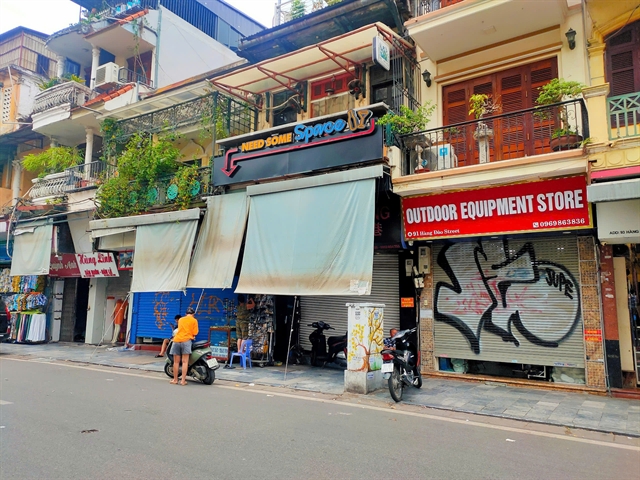 Economy
Economy


|
| Shops in central Hà Nội districts have been reported to partially close down in confusion and difficulties in following new tax regulations. VNA/VNS Photo Đoàn Tùng |
HÀ NỘI — One week into enforcing Decree No. 70/2025/NĐ-CP, the mandatory use of e-invoices via point-of-sale (POS) systems, has revealed multiple technical and procedural difficulties, particularly for older and small-scale vendors.
Many business households complained of software malfunctions, including system freezes and invoice duplication during peak hours, mainly due to unstable connections with the tax database. Platforms frequently crashed or failed to transmit invoice data, while basic functions such as filtering invoice status were unavailable, complicating daily operations.
A café owner in Hà Nội noted that some systems became unresponsive when issuing invoices and lacked features to help track issued or pending receipts. At a local phở shop, owners nearing retirement age said they were unfamiliar with tax documents and unsure whether they now needed to hire a cashier or accountant just to stay compliant.
Compounding these issues, many vendors expressed confusion over the requirement to input either the buyer’s taxpayer identification number (TIN) or citizen ID on every invoice. For retail-facing businesses like eateries or pharmacies, where most customers decline invoices and are reluctant to share personal details, this regulation has proved difficult to implement in practice.
Inconsistent guidance and limited preparation time have added to the frustration. With only three months to prepare and official instructions issued late, many business owners lacked time to adapt. Online forums show that even professional accountants are unclear on how to record walk-in sales, especially since most invoice templates contain only a single field for TINs, raising doubts about how to input personal IDs.
Experts say that while the system’s long-term benefits are clear, the immediate rollout has placed a strain on businesses with limited digital skills or prior experience in formal accounting.
“Many households have never used formal invoices or point-of-sale software before,” one software provider said.
“The hesitation mostly stems from unfamiliarity and concern over unexpected costs. Older vendors, in particular, face a steep learning curve.”
Despite the rocky start, tax officials maintain that the shift to e-invoicing will improve transparency, help curb tax evasion and protect consumer rights. Electronic invoices provide verifiable transaction records, discourage under-the-table dealings, and promote more accountable business practices.
Nguyễn Văn Phụng, former Director of the Taxation Department for Large Enterprises under the Ministry of Finance, noted that paper invoices could be easily altered after the fact.
“With digital systems, every invoice is timestamped and logged to the second. There’s no room to backdate or adjust records off the books,” he said.

|
| Several shops were closed down in central Hà Nội as owners waited for further instructions on new systems. VNA/VNS Photo Đoàn Tùng |
Phụng added that while the transition might initially disrupt familiar routines, it would help eliminate grey zones in the informal economy and rebuild trust among vendors, customers and regulators.
In response to implementation issues, the General Department of Taxation organised a workshop on June 5 to hear directly from small business owners. Thirty households raised more than 80 concerns, ranging from technical glitches to legal uncertainties.
According to the department, Việt Nam has approximately 1.975 million active business households.
At the event, Deputy Director Mai Sơn emphasised that the policy’s aim was not to increase administrative burdens but to modernise the tax system gradually. He said support mechanisms would remain in place to assist small businesses during the transition.
Authorities have committed to providing free accounting software and digital tools so that small vendors do not need to hire extra staff. Tax officers will be assigned to specific neighbourhoods and groups of households, offering tailored guidance while monitoring compliance.
Officials have also stressed that the new system allows for real-time oversight of invoice issuance. While irregularities may trigger inspection, compliant businesses will receive prioritised support to maintain uninterrupted operations.
While initial enforcement has been met with technical and operational challenges, both authorities and experts view e-invoicing as a necessary step toward formalising business practices and expanding the national tax base. Over time, as vendors become more familiar with the system and support structures improve, uptake is expected to accelerate across the country. VNS




